Swagger extension for Eve powered RESTful APIs.
from eve import Eve
from eve_swagger import swagger, add_documentation
app = Eve()
app.register_blueprint(swagger)
# required. See http://swagger.io/specification/#infoObject for details.
app.config['SWAGGER_INFO'] = {
'title': 'My Supercool API',
'version': '1.0',
'description': 'an API description',
'termsOfService': 'my terms of service',
'contact': {
'name': 'nicola',
'url': 'http://nicolaiarocci.com'
},
'license': {
'name': 'BSD',
'url': 'https://github.com/pyeve/eve-swagger/blob/master/LICENSE',
},
'schemes': ['http', 'https'],
}
# optional. Will use flask.request.host if missing.
app.config['SWAGGER_HOST'] = 'myhost.com'
# optional. Add/Update elements in the documentation at run-time without deleting subtrees.
add_documentation({'paths': {'/status': {'get': {'parameters': [
{
'in': 'query',
'name': 'foobar',
'required': False,
'description': 'special query parameter',
'type': 'string'
}]
}}}})
if __name__ == '__main__':
app.run()When the API is up and running, visit the /api-docs endpoint. The resulting
JSON can then be used with swagger tooling, like the Swagger UI or Swagger Editor:
If you get the error "Can't read from server. It may not have the appropriate
access-control-origin settings" from Swagger UI, you might want to enable CORS
support with the X_DOMAINS and X_HEADERS configuration in your Eve
settings.py:
X_DOMAINS = ['http://localhost:8000', # The domain where Swagger UI is running
'http://editor.swagger.io',
'http://petstore.swagger.io']
X_HEADERS = ['Content-Type', 'If-Match'] # Needed for the "Try it out" buttonsFor more information check the CORS documentation of Swagger UI and Swagger Editor.
$ pip install eve-swagger
If you would like to include description fields to your swagger docs you can
include a description field in your schema validations in your settings.py.
This can be done per field as well as on the resource-level.
As an example:
...
'description': 'Description of the user resource',
'schema': {
'userName': {
'description': 'The username of the logged in user.',
'type': 'string',
'minlength': 1,
'maxlength': 256,
'required': True
},
}
...NOTE: If you do use that feature make sure that the TRANSPARENT_SCHEMA_RULES
in your settings.py is also turned ON, otherwise you will get complains from the
Cerberus library about "unknown field 'description' for field [yourFieldName]"
You can disable the documentation of a specific resource by adding a disable_documentation field
to the resource definition in settings.py. This means that the resource will not show up in
the paths or definitions sections of the swagger docs.
...
'person': {
'item_title': 'person',
'disable_documentation': True,
'schema': {...}
}
...By setting app.config['ENABLE_HOOK_DESCRIPTION'] to True you can enable the description of all Eve event hooks.
This is done by showing the docstrings of the callback functions in the swagger docs under the appropriate paths.
def foo(request, lookup):
""" Do something before GETting all the people """
pass
def bar(response):
""" Do something when you've fetched the database entries """
pass
...
app.config['ENABLE_HOOK_DESCRIPTION'] = True
...
app.on_pre_GET_people += foo
app.on_fetched_resource_people += barThe swagger docs will now look like this:
"paths": {
"/people": {
"get": {
...,
"description": "**Hooks**:\n* `on_pre_GET_people`:\n\n * `foo`:\n\n Do something before GETting all the people\n\n\n* `on_fetched_resource_people`:\n\n * `bar`:\n\n Do something when you've fetched the database entries\n\n"
}
}
}Which will be rendered by Swagger like this:
Eve-Swagger is an open source project by Nicola Iarocci. See the original LICENSE for more information.



